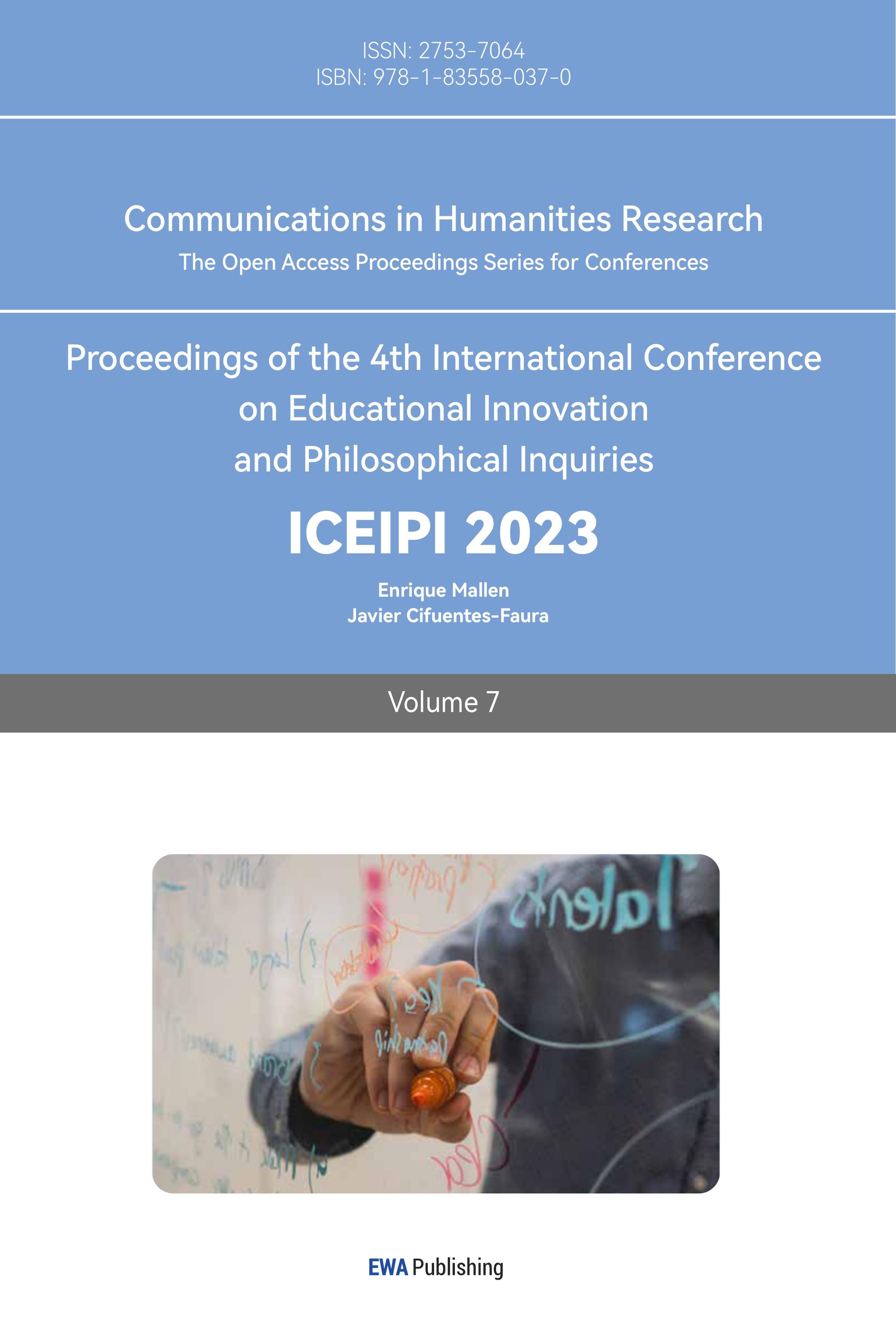1.Introduction
Generation Z refers to people born from 1995 to 2010, taking up 30% of the world’s population and reaching almost 2 billion [1]. According to the Bloomberg Report in 2021, Gen Z has $360 billion in disposable income [2]. Therefore, due to the enormous population and spending power, Generation Z has become a dominant financial force in the marketplace that marketers need to pay attention to. Therefore, a thorough understanding of Generation Z’s personality, preferences, and behavior is required to produce effective marketing communication.
Since personality is an elusive term to estimate and qualify, multiple instruments have developed to evaluate personality differences. The MBTI is one of the instruments that is said to be widely used globally for comprehending differences in personality [3]. It assesses an individual’s personality based on four dichotomies: Extraversion (E) vs. Introversion (I), Sensing (S) vs. Intuition (N), Thinking (T) vs. Feeling (F), and Judging (J) vs. Perceiving (P) [3]. As each dichotomy has two possible outcomes, 16 distinct personality types have resulted. These personality types have been used to explain behaviors in various contexts, including communication and decision-making.
The relationship between personality and consumer behavior has been debated since the last century [4]. While previous studies have investigated the relationship between personality and consumer behavior, relatively little research has been conducted to investigate the relationship between Gen Z’s MBTI personality types and marketing communication. By understanding how personality types influence Gen Z’s responses to marketing communication and purchasing behavior, businesses could create effective marketing communication strategies that resonate with their target audience.
This study investigates the relationship between Generation Z’s personality, measured by MBTI, and marketing communication. Specifically, the author investigates how different Gen Z’s personality types respond to different types of marketing messages and the impact of personality types on purchasing behavior. This study’s findings will help marketers tailor marketing strategies to specific Gen Z’s personality types, ultimately improving the effectiveness of marketing messages to this new generation.
2.Literature Review
The research design will be a mixed-methods approach consisting of both qualitative and qualitative research methods. The research will begin with a literature review of existing studies on Generation Z, personality traits, and purchasing behavior. This will provide a theoretical foundation for the study and help to identify any research gaps. Since the number of participants is relatively small, the author decided to conduct the qualitative survey in four categories instead of every single personality type, which include Analysts (INTJ, INTP, ENTJ, ENTP), Diplomats (INFJ, INFP, ENFJ, ENFP), Sentinels (ISTJ, ISFJ, ESTJ, ESFJ), and Explorers (ISTP, ISFP, ESTP, ESFP).
2.1.The Four Catagories of the MBTI Model
2.1.1.Analysts
Analysts are known for their intelligence, rationality, independence, curiosity, and problem-solving skills [5]. The four roles that fall under Analysts are Architects (INTJ), who are visionary planners; Logicians (INTP), who are creative problem-solvers, Commanders (ENTJ), who are decisive leaders; and Debaters (ENTP), who are persuasive thinkers [5].
2.1.2.Diplomats
Diplomats are known for their empathy, intuition, and sensitivity [6]. The four roles that fall under Diplomats are Advocates (INFJ), who are visionary leaders; Mediators (INFP), who are reconcilers, Protagonists (ENFJ), who are inspiring leaders; and Campaigners (ENFP), who are free-spirited individuals [6].
2.1.3.Sentinels
Sentinels are known for their practicability, dependability, diligence, and loyalty [7]. The four roles that fall under Sentinels are Logisticians (ISTJ), who are meticulous problem solvers, Defenders (ISFJ), who are dedicated caretakers, Executives (ESTJ), who are goal-orientated leaders; and Consuls (ESFJ), who are warm-hearted individuals [7].
2.1.4.Explorers
Explorers are known for their adventurous spirit, adaptability, and spontaneity [8]. The four roles that fall under Explorers are Virtuosos (ISTP), who are hands-on problem-solver, Adventurers (ISFP), who are free-spirited individuals, Entrepreneurs (ESTP), who are adaptable risk-takers; and Entertainers (ESFP), who are enthusiastic performers [8].
2.2.The Impact of Personality on Purchasing Behavior
Since 2002, researchers have found the influence of personality on purchasing behavior. According to Kassarjin & Sheffet, personality traits could account for roughly 10% of the variation in consumers’ purchasing decisions and product preferences and are critical determinants of consumer behavior [9]. Moreover, Evanschitzky and Wunderlich found a statistically significant association between brand choice and personality as a predictive factor [10].
3.Method
3.1.Questionnaire
Primary data (qualitative) was collected through a questionnaire comprising structured questions. The survey was conducted using the convenience sampling method. A total of 80 respondents were selected as a sample. To ensure a diverse sample, these respondents are drawn from a specific age group (Generation Z), different genders, income groups, educational levels, cultural backgrounds, and geographical locations. Both online and offline questionnaires were displayed for a week through social media such as WeChat and Instagram, as well as physical posters displayed in the author’s school (The New School). The survey consists of questions regarding the participants’ demographics, self-reported personality types (using Myers-Briggs Type Indicator, MBTI), and their attitudes, perceptions, and behaviors regarding marketing communication. The study adhered to ethical protocols and all participants were required to provide their informed consent before their involvement.
3.2.Analyze Method
In this study, the author employed pie charts as a research method to investigate the preferred type of communication for each Myers-Briggs Type Indicator (MBTI) personality type, as well as the marketing campaigns that have appealed to them in the past. The pie charts allowed the author to visually represent the data, making it easier to identify the MBTI types that preferred specific communication and marketing campaigns. By analyzing the graphs and identifying the pie chart segments that were the largest for each MBTI type, the author was able to determine the preferred type of communication and marketing campaigns that appealed to each personality type. This Method allowed for a clear and visual representation of the data, which aided in analyzing the results.
4.Result
In this study, 80 surveys were collected, with 71 containing valid data for analysis. The respondents were divided into four MBTI types: Analyst, Diplomat, Sentinel, and Explorer, with 26, 27, 9, and 9 respondents, respectively. The survey results showed that among Gen Z participants, the most common personality types were Analyst (INTJ, INTP, ENTJ, ENTP) and Diplomat (INFJ, INFP, ENFJ, ENFP).
4.1.Different MBTI Types Prefer Different Types of Marketing Campaign
For the first question – what type of communication do you prefer in a marketing campaign – the results showed that Analysts prefer practical information and a sense of security in marketing communication (see Figure 1-a), Diplomats prefer an emotional appeal and personal connection (see Figure 1-b), Sentinels prefer detailed information (see Figure 1-c), and Explorers prefer unique and exciting information about the product or service (see Figure 1-d).
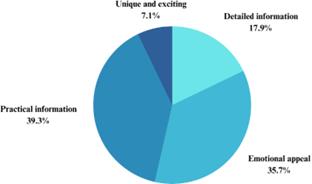 |
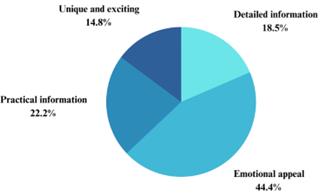 |
a. Analysts |
b. Diplomats |
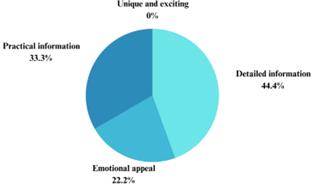 |
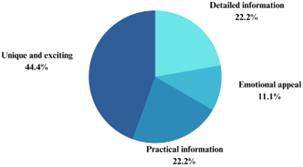 |
c. Sentinels |
d. Explorers |
Figure 1: Type of communication.
4.2.Different MBTI Are Appealed to Different Types of Marketing Campaign
For the second question – which marketing campaign has appealed to you the most in the past – the results showed that Analysts prefer campaigns emphasizing reliability and trustworthiness (see Figure 2-a), Diplomats prefer campaigns that create a sense of belonging (see Figure 2-b), Sentinels prefer campaigns emphasizing features and benefits (see Figure 2-c), and Explorers prefer campaigns that convey a sense of adventure and excitement (see Figure 2-d).
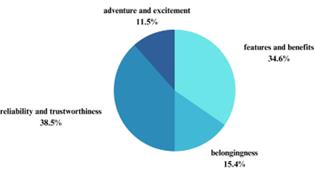 |
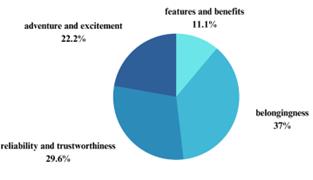 |
a. Analysts |
b. Diplomats |
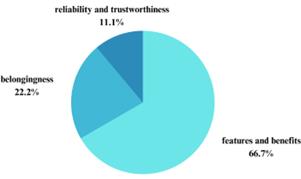 |
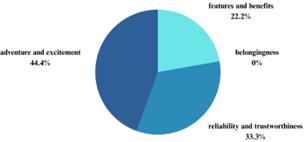 |
c. Sentinels |
d. Explorers |
Figure 2: Marketing campaigns that have appealed to different MBTI the most in the past.
4.3.The Importance of Effective Communication in a Marketing Campaign to Different MBTI
For the third question – how important is effective communication in a marketing campaign to you – the results showed that analysts think it is somewhat important, diplomats think it is extremely important, sentinels think it is extremely important, and explorers think it is somewhat important (see Figure 3).
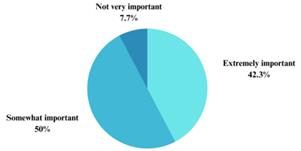 |
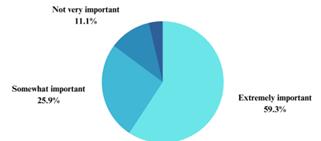 |
a. Analysts |
b. Diplomats |
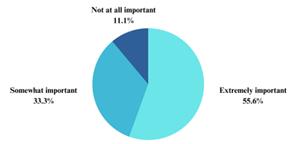 |
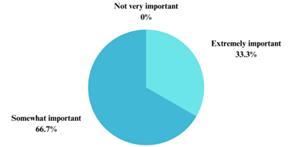 |
c. Sentinels |
d. Explorers |
Figure 3: How Important is effective communication in a marketing campaign to different MBTI.
4.4.Whether MBTI Would Influence Different MBTI’s Purchasing Decision
For the fourth question – do you think that your personality type influences your purchasing decisions – the results showed that all personality types think their personality type influences their purchasing decisions (see Figure 4).
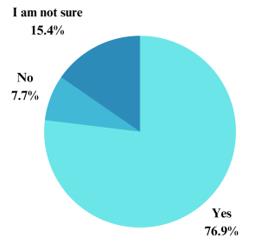 |
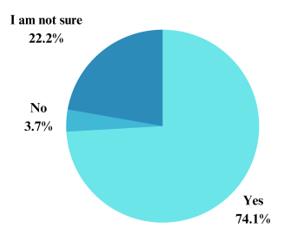 |
a. Analysts |
b. Diplomats |
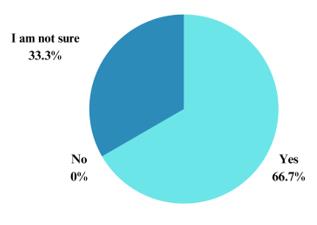 |
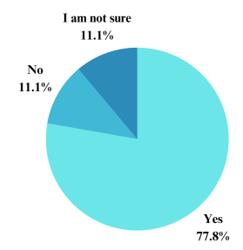 |
c. Sentinels |
d. Explorers |
Figure 4: Different MBTI thought about their personality type influences their purchasing decisions.
4.5.Different MBTI Have Different Likelihoods of Purchasing a Product or Service Based on a Marketing Campaign
For the fifth question – how likely are you to purchase a product or service based on a marketing campaign that appeals to your personality type – the results showed that all of the personality types think they are somewhat likely to purchase a product or service based on a marketing campaign that appeals to their personality type (see Figure 5).
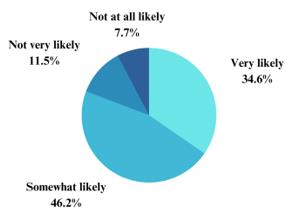 |
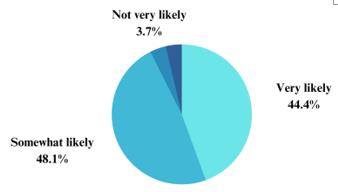 |
a. Analysts |
b. Diplomats |
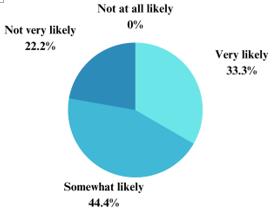 |
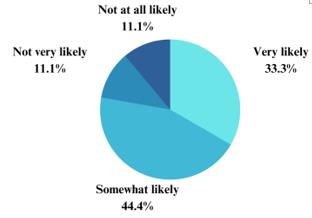 |
c. Sentinels |
d. Explorers |
Figure 5: Different MBTI have different likelihoods of purchasing a product or service based on a marketing campaign.
5.Discussion
The study’s findings provide insights into how different personality types respond to marketing campaigns and communication styles; each MBTI type has a distinct preference for specific communication and marketing campaigns.
The study’s findings correspond to the characteristics of the four MBTI categories. Specifically, Analysts who are “logical and enterprising” prefer practical information and reliability in marketing campaigns (16 Personalities); Diplomats who are “compassionate and caring” prefer emotional appeals and a sense of belongingness in marketing campaigns (16 Personalities); Sentinels who are “hardworking and dutiful” prefer detailed information and specific features in marketing campaigns (16 Personalities); Explorers who are “curious and fun-seeking” prefer a sense of adventure and excitement in marketing campaigns (16 Personalities).
Based on the research findings, the following are recommended communication strategies for marketing campaigns targeting Gen Z based on their personality types:
5.1.Marketing to Analysts
To appeal to Analysts, marketers need to provide practical information that instills a sense of security. This can be achieved by focusing on the advertised product or service and providing detailed information about its features, benefits, and performance.
Secondly, Analysts value reliability and trustworthiness and expect these qualities from the products and services they purchase. Marketers should ensure their campaigns emphasize these qualities through testimonials or reviews from satisfied customers.
Thirdly, Analysts will likely respond well to data-driven messaging as logical and analytical thinkers. Marketers should incorporate data, statistics, and other objective facts to support their claims about the advertised product or service.
Lastly, Analysts prefer clear and concise messaging, making it easy to understand. Marketers should refrain from using technical jargon or complicated language that could alienate this group.
5.2.Marketing to Diplomats
Diplomats tend to respond positively to marketing campaigns that connect with them personally and. Marketers can achieve this by including relatable stories, messages that align with their values, and scenarios that resonate with their beliefs.
Secondly, Diplomats value social connections and belonging. Marketers can emphasize this by creating campaigns highlighting inclusivity and a shared community of individuals with similar interests and values.
Thirdly, Diplomats value individuality and unique experiences. Marketers should personalize their messaging and advertising strategies to appeal to their personality traits and preferences.
Lastly, Diplomats appreciate transparency and authenticity in advertising. Marketers should avoid manipulative tactics and be upfront and honest about their brand values and mission.
5.3.Marketing to Sentinels
Sentinels place a high value on accuracy and practicality, so they prefer to have a thorough understanding of the product or service. Marketers should provide clear and detailed information on the product or service, including its features, benefits, and specifications.
Secondly, Sentinels prioritize the practical aspects of the product or service in marketing campaigns, so marketers should emphasize the key features and benefits to communicate effectively with them.
Thirdly, Sentinels prefer transparent and honest information, so marketers should prioritize transparency and accuracy in their communication strategies, providing factual and truthful information.
Lastly, Sentinels are analytical and logical; therefore, they appreciate data and statistics. Marketers can effectively communicate with them using data and statistics to support their claims about the product or service.
5.4.Marketing to Explorers
Explorers are naturally curious and drawn toward products or services that offer novelty and excitement. Hence, it is crucial to highlight the unique features and benefits of the product or service in a way that aligns with their adventurous spirit.
Secondly, Explorers are visually oriented and appreciate visually appealing and attention-grabbing content. Companies should include visuals such as bright colors, bold typography, and captivating imagery to capture their interest and attention.
Thirdly, Explorers enjoy exploring new things and having new experiences. By generating excitement around the product or service, companies can appeal to their sense of adventure and encourage them to try something new.
Lastly, Explorers value authenticity and may respond poorly to overly promotional or sales-oriented marketing campaigns. Companies should strive to create genuine and authentic marketing communications that resonate with them rather than solely focusing on making a sale.
6.Conclusion
In conclusion, effective communication strategies are essential for businesses to connect and communicate with Gen Z effectively. By utilizing MBTI to understand Gen Z’s personality types, businesses can develop tailored communication strategies that resonate with their target audience. This research provides insights into how to communicate with Gen Z of different personalities in marketing campaigns using MBTI, including personalization, authenticity, and inclusivity. By utilizing these strategies, businesses can create effective communication campaigns that resonate with Gen Z and promote brand loyalty.
However, the present study has its limitations, the primary limitation being the small sample size of Sentinel and Explorer respondents. While the study analyzed 71 valid responses, only 9 were Sentinel, and 9 were Explorer. The small number of Sentinel and Explorer participants prevented the study from fully understanding the preferred marketing communication of these two personality types. Hence, future studies should focus on including a more significant number of Sentinel and Explorer participants to achieve a more diverse and representative population sample.
Another limitation of this study is that the survey was conducted over one week, and only a few respondents were surveyed. There may need to be more than this study period to capture the preferred marketing methods of Gen Z consumers over a more extended period. Future studies could consider conducting surveys over extended periods, such as several months, to account for any changes in Gen Z consumers’ preferences for marketing communication methods.
Even though the present study provides some insight into the preferred marketing communication methods of Gen Z consumers based on their personality types, the limitations of this study highlight the need for further research to replicate and extend these findings. By including a more extensive and diverse sample of Gen Z consumers, future research can provide a more comprehensive understanding of their preferences and help businesses tailor their marketing strategies accordingly.
References
[1]. McCrindle. (2022). Gen Z and Gen Alpha Infographic Update. Retrieved from https://mccrindle.com.au/article/topic/generation-z/gen-z-and-gen-alpha-infographic-update/
[2]. Bloomberg. (2021, November 17). Gen Z Has $360 Billion to Spend. Trick Is Getting Them to Buy. Retrieved from https://www.bloomberg.com/news/articles/2021-11-17/gen-z-has-360-billion-to-spend-trick-is-getting-them-to-buy#xj4y7vzkg
[3]. Randall, K., Isaacson, M., & Ciro, C. (2017). Validity and Reliability of the Myers-Briggs Personality Type Indicator: A Systematic Review and Meta-analysis. Journal of Best Practices in Health Professions Diversity, 10(1), 1–27. https://www.jstor.org/stable/26554264
[4]. Pelau, C.,Serban, D. & Chinie,A.(2018).The influence of personality types on the impulsive buying behavior of a consumer. Proceedings of the International Conference on Business Excellence,12(1) 751-759. https://doi.org/10.2478/picbe-2018-0067
[5]. 16Personalities, n.d. Roles - Analysts. Retrieved from https://www.16personalities.com/articles/roles-analysts
[6]. 16Personalities, n.d. Roles - Diplomats. Retrieved from https://www.16personalities.com/articles/roles-diplomats
[7]. 16Personalities, n.d. Roles: Sentinels. Retrieved from https://www.16personalities.com/articles/roles-sentinels
[8]. 16Personalities, n.d. Roles - Explorers. Retrieved from https://www.16personalities.com/articles/roles-explorers
[9]. Arnould, E.J., Price, L., & Zinkhan, G.M. (2002). Consumer. New York, N.Y: McGraw Hill.
[10]. Evanschitzky, H. & Wunderlich, M. (2006). An Examination of Moderator Effects in the Four-Stage Loyalty Model. Journal of Service Research. 8(4), 330-345.
Cite this article
Yu,X. (2023). The Relationship Between Generation Z’s Myers-Briggs Personality Types and Marketing Communication. Communications in Humanities Research,7,274-283.
Data availability
The datasets used and/or analyzed during the current study will be available from the authors upon reasonable request.
Disclaimer/Publisher's Note
The statements, opinions and data contained in all publications are solely those of the individual author(s) and contributor(s) and not of EWA Publishing and/or the editor(s). EWA Publishing and/or the editor(s) disclaim responsibility for any injury to people or property resulting from any ideas, methods, instructions or products referred to in the content.
About volume
Volume title: Proceedings of the 4th International Conference on Educational Innovation and Philosophical Inquiries
© 2024 by the author(s). Licensee EWA Publishing, Oxford, UK. This article is an open access article distributed under the terms and
conditions of the Creative Commons Attribution (CC BY) license. Authors who
publish this series agree to the following terms:
1. Authors retain copyright and grant the series right of first publication with the work simultaneously licensed under a Creative Commons
Attribution License that allows others to share the work with an acknowledgment of the work's authorship and initial publication in this
series.
2. Authors are able to enter into separate, additional contractual arrangements for the non-exclusive distribution of the series's published
version of the work (e.g., post it to an institutional repository or publish it in a book), with an acknowledgment of its initial
publication in this series.
3. Authors are permitted and encouraged to post their work online (e.g., in institutional repositories or on their website) prior to and
during the submission process, as it can lead to productive exchanges, as well as earlier and greater citation of published work (See
Open access policy for details).
References
[1]. McCrindle. (2022). Gen Z and Gen Alpha Infographic Update. Retrieved from https://mccrindle.com.au/article/topic/generation-z/gen-z-and-gen-alpha-infographic-update/
[2]. Bloomberg. (2021, November 17). Gen Z Has $360 Billion to Spend. Trick Is Getting Them to Buy. Retrieved from https://www.bloomberg.com/news/articles/2021-11-17/gen-z-has-360-billion-to-spend-trick-is-getting-them-to-buy#xj4y7vzkg
[3]. Randall, K., Isaacson, M., & Ciro, C. (2017). Validity and Reliability of the Myers-Briggs Personality Type Indicator: A Systematic Review and Meta-analysis. Journal of Best Practices in Health Professions Diversity, 10(1), 1–27. https://www.jstor.org/stable/26554264
[4]. Pelau, C.,Serban, D. & Chinie,A.(2018).The influence of personality types on the impulsive buying behavior of a consumer. Proceedings of the International Conference on Business Excellence,12(1) 751-759. https://doi.org/10.2478/picbe-2018-0067
[5]. 16Personalities, n.d. Roles - Analysts. Retrieved from https://www.16personalities.com/articles/roles-analysts
[6]. 16Personalities, n.d. Roles - Diplomats. Retrieved from https://www.16personalities.com/articles/roles-diplomats
[7]. 16Personalities, n.d. Roles: Sentinels. Retrieved from https://www.16personalities.com/articles/roles-sentinels
[8]. 16Personalities, n.d. Roles - Explorers. Retrieved from https://www.16personalities.com/articles/roles-explorers
[9]. Arnould, E.J., Price, L., & Zinkhan, G.M. (2002). Consumer. New York, N.Y: McGraw Hill.
[10]. Evanschitzky, H. & Wunderlich, M. (2006). An Examination of Moderator Effects in the Four-Stage Loyalty Model. Journal of Service Research. 8(4), 330-345.





